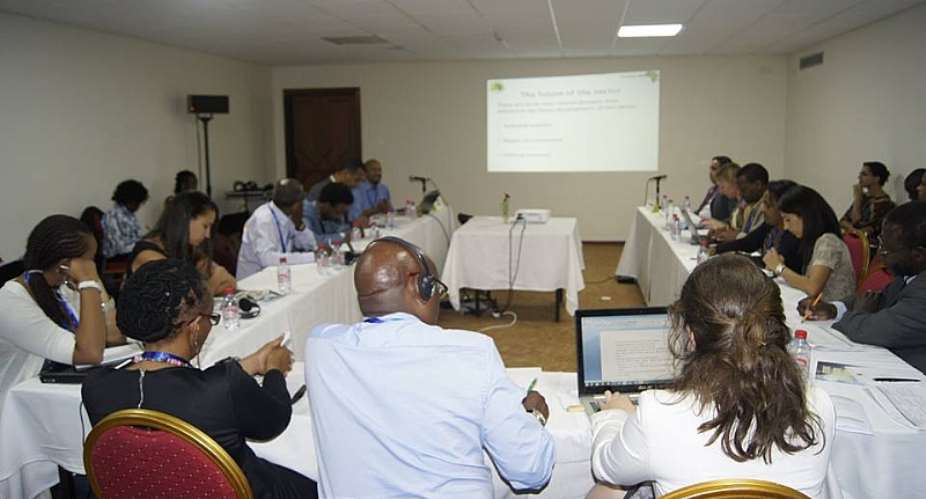The Fourth Conference on Climate Change and Development in Africa (CCDA-IV) has been an opportunity to reflect activities on the continent that ensure that agriculture is embedded into a solution space, in which climate change has become a risk amplifier.
But Africa would need to have a united voice to seek climate justice at the UNFCCC Conference of Parties (COP 20).
Dr. Tolbert Thomas Jallah, a representative of the Pan African Climate Justice Alliance (PACJA) speaks to Kofi Adu Domfeh on the journey from Marrakech to Lima and Paris.
Q: What was the expectation of a civil society umbrella body like PACJA?
A: The agenda is to build the awareness and to raise critical issues on behalf of the citizens and one of those issues that we want to voice here is how to position adequately smallscale farmers if we would be able to feed Africa. The impact of climate change on local communities, those who produce food for us is a major concern to us.
Q: Going by Conference discussions so far, do you get the feel that this objective is being realized?
A: It seems we are still far away from the realization of our objectives and even the commitments and pledges that are being made by our leaders; it is disappointing that or leaders are yet to fulfill to those commitments and we want to hold them accountable by raising a united voice by calling on them to sure that pledges, commitment are brought to realization. We are disappointed that the pledges made to curtail the impacts of climate change by the international community are also weak.
Q: Has is being worthwhile meeting as a continent to deliberate on issues of climate change in relations to agriculture and food production? What is your level of satisfaction?
A: At the moment we cannot be satisfied with the Conference at all cost because it has been business as usual; we've heard from the experts over and over again but we want to hear that the commitments have come to reality. We cannot be satisfied until the situation of smallscale farmers have changed; we cannot be satisfied until our governments have made those pledges to commit 10percent of their annual budgets to agriculture reality; we cannot be satisfied until the money to finance climate adaptation is reaching local communities.
Q: What then do we need to do as a continent to achieve something significant as we head for COP in Lima in December and later Paris 2015.
A: We need to go to these conferences with a united voice and an Africa position to ensure that Africa must have the solution for Africa. We need to ensure that our colleagues from the West, the industrialized nations will see reason to accept their historical responsibility as polluters and they will not infringe on us as a continent to pay back what we have done little to create.
Q: Is what ways do you expect African negotiators to drive this goal?
A: We need to ensure that Africa and African negotiators will be stable at the table and that they'll continue to listen to civil society and the voice of civil society will be heard with the help of our negotiators. As we end this phase by 2015, we need to reach an agreement and this must be a global agreement that must have the support of all countries, including the industrial countries who are the major polluters. We want to see our people move from abject poverty to live in prosperity in a continent of abundant natural resources.
End.





 Saglemi Housing Project will not be left to rot – Kojo Oppong Nkrumah
Saglemi Housing Project will not be left to rot – Kojo Oppong Nkrumah
 Transport fares hike: GPRTU issue two-day ultimatum
Transport fares hike: GPRTU issue two-day ultimatum
 ARC endorses Alan as presidential candidate – Buaben Asamoa
ARC endorses Alan as presidential candidate – Buaben Asamoa
 Akufo-Addo appoints Kwasi Agyei as new Controller and Accountant-General
Akufo-Addo appoints Kwasi Agyei as new Controller and Accountant-General
 PNC dismiss reports of mass resignations
PNC dismiss reports of mass resignations
 PAC advocates for revenue collectors to be engaged on commission basis, not full...
PAC advocates for revenue collectors to be engaged on commission basis, not full...
 Genser Energy commissions 110km of natural gas pipeline at Anwomaso
Genser Energy commissions 110km of natural gas pipeline at Anwomaso
 Naa Torshie calls for tolerance, peace ahead of 2024 election
Naa Torshie calls for tolerance, peace ahead of 2024 election
 Asantehene commends Matthew Opoku Prempeh for conceiving GENSER Kumasi Pipeline ...
Asantehene commends Matthew Opoku Prempeh for conceiving GENSER Kumasi Pipeline ...
 Let’s do away with ‘slash and burn politics’ in Ghana — Dr Adutwum
Let’s do away with ‘slash and burn politics’ in Ghana — Dr Adutwum
